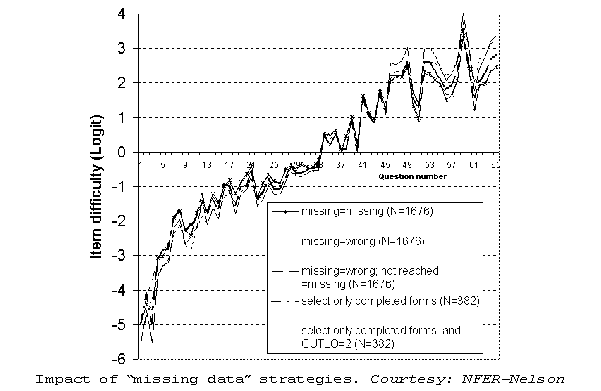
Ludlow and O'Leary (1999) state: "Missing data occur for a variety of reasons. Particularly problematic are those items an individual skipped or could not reach in time."
They go on to discuss four strategies:
(1) Omitted and not-reached items treated as not administered. This strategy may encourage students to respond only to items they are absolutely sure they will get correct.
(2) Omitted and not-reached items treated as incorrect. This encourages guessing and penalizes slow, careful work.
(3) Omitted items treated as incorrect and not-reached items treated as not administered. This encourages "guess rather than omit", but then "stop when it looks like the test is getting too hard."
(4) First, students are instructed to attempt every question. Then, for item calibration, omitted items treated as incorrect and not-reached items treated as not administered. The items are now anchored, and for person calibration, omitted and not-reached items treated as incorrect. This was adopted for TIMSS.
[This compromise pleases no one, but appears to match American testwiseness more closely than it does the caution expected in traditionalist cultures.]
Ludlow and O'Leary conclude: "The notion of a single, best approach exists in theory only, and suggested courses of action must be evaluated on a number of levels. ... Common sense and reasonable explanations still must govern decisions regarding how test data are analyzed and reported."
Ludlow, L.H., & O'Leary, M. (1999) Scoring omitted and not- reached items: practical data analysis implications. Educational and Psychological Measurement, 59, 4, 615- 603.
Note: though choices as to how to handle missing data must be made by all analysts, it is a testimony to the fundamental strength of Rasch that the precise choice usually has little impact on the measurement framework. The NFER-Nelson plot below, produced independently using their own data, indicates that their item calibrations are essentially equivalent under any reasonable "missing data" strategy.

What to Do about Missing Data? Ludlow, L., & O'Leary, M. … Rasch Measurement Transactions, 2000, 14:2 p.751
| Forum | Rasch Measurement Forum to discuss any Rasch-related topic |
Go to Top of Page
Go to index of all Rasch Measurement Transactions
AERA members: Join the Rasch Measurement SIG and receive the printed version of RMT
Some back issues of RMT are available as bound volumes
Subscribe to Journal of Applied Measurement
Go to Institute for Objective Measurement Home Page. The Rasch Measurement SIG (AERA) thanks the Institute for Objective Measurement for inviting the publication of Rasch Measurement Transactions on the Institute's website, www.rasch.org.
| Coming Rasch-related Events | |
|---|---|
| Jan. 16 - Feb. 13, 2025, Fri.-Fri. | On-line workshop: Rasch Measurement - Core Topics (E. Smith, Winsteps), www.statistics.com |
| Apr. 8 - Apr. 11, 2026, Wed.-Sat. | National Council for Measurement in Education - Los Angeles, CA, ncme.org/events/2026-annual-meeting |
| Apr. 8 - Apr. 12, 2026, Wed.-Sun. | American Educational Research Association - Los Angeles, CA, www.aera.net/AERA2026 |
| May. 15 - June 12, 2026, Fri.-Fri. | On-line workshop: Rasch Measurement - Core Topics (E. Smith, Winsteps), www.statistics.com |
| June 19 - July 25, 2026, Fri.-Sat. | On-line workshop: Rasch Measurement - Further Topics (E. Smith, Winsteps), www.statistics.com |
The URL of this page is www.rasch.org/rmt/rmt142h.htm
Website: www.rasch.org/rmt/contents.htm